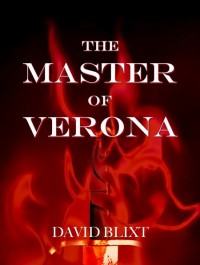Master of Verona – David Blixt

A few pages into Master of Verona one of the two characters who opens the book jumps out of the path of an oncoming horde, off a bridge and feet first into a river. That's pretty much how that first chapter runs for the reader, as well - straight into it, and swept off with the current.
And the action never really lets up. Before long, the main point of view settles firmly behind the eyes of Pietro, eldest son (eldest surviving, that is) of Dante Alaghieri. (Alaghieri, the poet insists, not Alighieri: the pronunciation has a point to it.) Seventeen-year-old Pietro, his little brother Jacopo (Poco), and their illustrious father have just arrived in Verona, and almost immediately Pietro is swept from a wedding celebration into a wild ride straight into battle – his first – at the heels of Cangrande, the Scaliger, the Greyhound.
Or is he? There is a prophecy about the Greyhound, which Cangrande has grown up believing applies to him ... but ... there is another candidate. This adds a whole new layer to the story: a man's life is shaped by his belief in what his destiny is supposed to be. Change the destiny, mute it down from the phenomenal to the merely great, and there will be repercussions.
As another reviewer somewhere in there pointed out, there are a number of typos in the Kindle edition (stray apostrophes, "laying" instead of "lying") (how ironic is it that I initially misspelled "typos"?), but not so very many – not, I think, enough to turn me away from any but an otherwise very bad book. In an otherwise very good book, they are mere blips.
My familiarity with Dante is, I regret to say, mainly through second- and third-hand sources. I will certainly need to address that. It was wonderful fun reading David Blixt's version of the working poet.
It was around the time of the first battle against Padua that this began to remind me – in all good ways – of Guy Gavriel Kay's Tigana. There is something about Pietro being swept off his feet so by the charismatic and irresistible Cangrande that chimed in harmony with Devin's similar sweeping away by Alessan. Just a boy, if a rather extraordinary boy, caught up in the powerful wake of one of those men around whom history reshapes itself, a man who attracts the sort of loyalty it's hard to maintain in this age of jaded cynicism.
That's huge. Cangrande is magnificent, a man born at exactly the right time. Today … there is no one to follow with the sort of fierce devotion Cangrande inspires. Today he might begin a meteoric rise in politics, only to be brought down by an illegitimate child or a temper too fully expressed; the standards are more stringent today. But give the man a sword and a horse (or a bottle and a mule) and stand back: something spectacular is going to happen. The Scaliger in his own time and place is something glorious – a leader, the embodiment of a Cause, someone and something to fight for – and fight beside, to sacrifice for and sacrifice to, unto one's own life.
The book as a whole has a general feel which is reminiscent of Tigana. The setting of Master of Verona is, of course, Italy, in the 14th century, but there is for me a strong flavor of fantasy – it feels like as much a fantasy Italy as the Hand in Tigana. This Italy is a feral place where a poet is revered as a rock star. It is a setting of feuds and battles, swords and, if not sorcery, then soothsayers, and astrology and fate and destiny taken very, very seriously – and it's all seen largely through this young man's fresh eyes, with excitement and wonder.
There is a battle near the end of Tigana which, the first time I read it, might as well have been happening around me. My heart pounded, my breathing was short and fast, and internally I was ducking and dodging and parrying. I've never had an experience like it while reading … till now. Blixt hasn't stressed my blood pressure to quite the same levels, but the duel … Whoof.
It's clear from the flurry of words surrounding this book that it has something to do with the tale of Romeo and Juliet. This idea is a minefield, I think; like any delving into Shakespearean topics it could go drastically badly or beautifully well. Blixt already proved to me that he knows Shakespeare; I loved Her Majesty's Will as much as anything I read this year. I was inclined to trust him on this one.
I was right.
By the time a friend of Pietro reveals that his actual Christian name is Romeo (threatening his friends with death if they ever use it), the setup had seen to it that I cared about these characters and the announcement gave me a sinking feeling. No, I thought, dammit, not these guys.
And I just realized: that feeling is what I read for. That level of investment in the story and its people - that is the goal. There are lots (and lots) of bad books out there; there are plenty of mediocre books and even good books that are fun to read without engaging the emotions to any great extent. There are even quite a few books which do cause laughter and tears and all that. But this - this is near the pinnacle of the reading experience in my book (so to speak). This is being made to care, very very much indeed, about what happens to the people who live and breathe through the words - made, without ever feeling manipulated. At this level, this is pretty rare.
 1
1
 3
3






